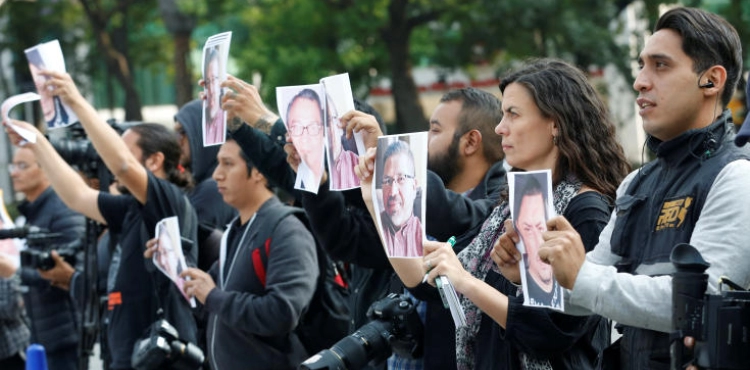Mexican journalist Julio Cesar Zobiaga shudders when his daughter asks him why he feared for his life ... he dared to raise his voice after the killing of a colleague and began to feel the consequences quickly through death threats and an armed attack On his newspaper presses.
His experience highlights southern Mexico´s position as one of the most dangerous regions in a country that is considered one of the most dangerous places in the world for journalists.
Zobiaga helped prepare the body of Pablo Morogares, a journalist with the digital newspaper BM Notetheus, after gunmen killed him and the policeman who was guarding him in a restaurant in Iguala, Guerrero state, in the south of the country.
Zobiaga, editor of La Tarde newspaper in Iguala, made a public appeal to seek justice for his 48-year-old colleague, who survived an attack in 2016.
"It was a brutal assassination," he told AFP. "I saw what Pablo looked like. I had to cover the body for someone to see him who wanted to come to say goodbye, but less than four of his colleagues came. Everyone is afraid. We live in terror."
The next day, Zobiaga received threats on social media. A week ago, gunmen opened fire on the offices of "Diario de Iguala", where his newspaper is printed.
Zobiaga appealed to the left-wing government of Andres Manuel Lopez Obrador to provide him with protection.
“At least 10 journalists from Iguala received death threats” from criminal groups, he said.
Three other journalists were killed in Mexico this year, they were Jorge Arminta, Victor Alvarez and Maria Elena Viral.
Since 2000, more than 100 Mexican journalists have been killed, without arresting the perpetrators of 92 percent of these crimes, according to press groups.
Earlier this year, videos circulated on social media that included threats from armed groups against their opponents and many journalists.
Zobiaga said intimidation is not new for Mexican journalists, "but we are now witnessing the implementation of these threats."
To protect himself, the 51-year-old editor rarely stays at the same address, and he changes his way into the business regularly. He has long since stopped walking with his family.
"The most painful part for me is going home and having my youngest daughter ask me, ´Dad, why do they want to kill you? How long will you live?" Zobiaga explains, in a suffocated voice, during a phone interview.
Due to the torrent of threats, most reporters in Iguala chose to practice self-censorship.
"A lot of people don´t want to talk, let alone publish. We are in the crossfire," said another journalist, who asked not to be named after he had to leave the city because his life was in danger.
He added, "You have a group that threatens you to publish this or that information, while others threaten you (opposing it) if you do not publish it."
Investigative newspaper Prosecco reported Wednesday that the "Los Talacos" criminal gang threatened Iguala journalists with death after being accused of siding with rival gang "Guerreros Onidos".
In response, the city´s correspondents opted for a policy of self-censorship, according to Proseco.
Shortly before his murder, Pablo Morogares published an investigation into a crime in an area he said was under the control of Los Talacos.
Since 2006, when the government launched a military campaign against drug traffickers, Mexico has seen an increasing wave of violence.
Since the launch of the campaign to date, 293,336 people have died, according to official data that do not specify the number of victims of organized crime groups.
The Mexican authorities held the "Guerreros Onidos" gang of drug traffickers responsible for the loss of 43 students in September 2014 from the Teachers College in Ayozinapa in Guerrero state.
The non-governmental organization Reporters Without Borders points out that the situation in Iguala is among the most dangerous in Mexico, according to the organization’s representative, Balbina Flores, who has also received threats.
She said, "It seems that the murders of journalists go unpunished, which explains why they continue."












